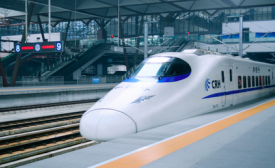china
China has launched its first spacecraft bound for the surface of the Moon. The Chang'e-3 mission will deploy a rover and conduct astronomical observations.This is will be the first spacecraft from any nation to land on the Moon since 1976, breaking a long drought of touchdowns. The mission is also another sign of China's growing influence in space.
The great imperialists of the 19th Century built railroads to solidify their control of vast expanses of land and incorporate their territory into modern industrial economies. And although the construction of railroads may seem archaic today, the government of China has demonstrated their continued relevance in both internal state building and external diplomacy.
China seemed to take the air out of the Geneva Accord on Iran with its simultaneous announcement last week that it is creating an Air Defense Identification Zone (ADIZ) in the East China Sea. The ADIZ will be implemented by the Chinese Ministry of Defence and obliges all aircraft flying in the zone to accommodate a number of rules including: the identification of flight plans, the presence of any transponders and two-way radio communication with Chinese authorities.
Japanese Prime Minister Shinzo Abe said yesterday he would discuss China's air defence identification zone with US Vice-President Joe Biden in Tokyo to co-ordinate their stance after apparently contradictory responses. China raised regional tensions with its declaration last weekend of the zone, which covers islands in the East China Sea at the centre of a dispute between Beijing and Tokyo. Aircraft traversing the area are required to submit their flight plans.
The main streets of Shin-Okubo — Tokyo’s Koreatown — are lined with smoky barbecue restaurants and overlit cosmetics emporiums. Staircases lead down to basement music venues and up to hidden drinking holes. Japanese once thronged the neighborhood, which is home to many ethnic Koreans and known for its fiery food and late nights. But in recent months, the crowds have thinned, replaced by anti-Korean protesters who have turned Shin-Okubo into a rough barometer of deteriorating Japan-Korea relations.
The New England Patriots' cheerleaders spent two weeks in Beijing recently, leading pep rallies and cheer clinics. Former San Francisco 49ers superstar quarterback Joe Montana toured the Great Wall of China in between visits to local flag football games. They're both examples of an outreach effort by NFL China, the NFL organization tasked with recruiting NFL fans and introducing the game of American football to China's young atheletes.

The great imperialists of the 19th Century built railroads to solidify their control of vast expanses of land and incorporate their territory into modern industrial economies. And although the construction of railroads may seem archaic today, the government of China has demonstrated their continued relevance in both internal state building and external diplomacy.
Several governments joined Japan Tuesday in criticizing China’s latest bid to carve out a zone of control in the East China Sea, including Australia summoning Beijing’s ambassador to voice opposition over the move.







